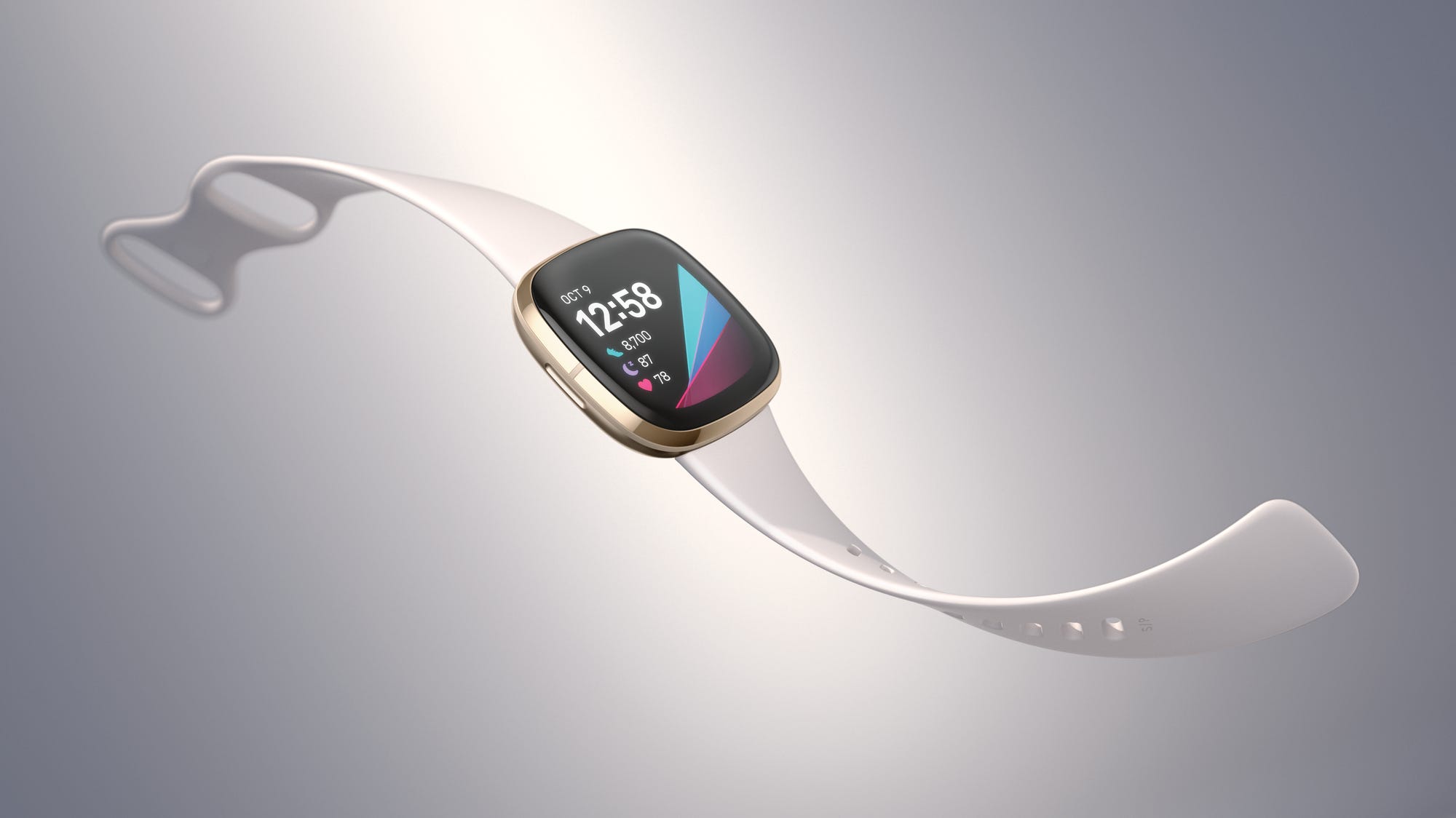- Fitbit announced a new smartwatch called the Sense that it says can measure stress, monitor skin temperature, and take an electrocardiogram.
- The announcement comes just before Apple is expected launch a new Apple Watch in September, as it has in years past.
- With the Sense, Fitbit is getting ahead of Apple in some ways and catching up in others.
- The Apple Watch cannot measure skin temperature or stress levels like the Sense, for example, but it has offered ECG readings since 2018.
- The launch also comes as researchers are examining whether wearables can be useful in detecting symptoms of illness early given the COVID-19 pandemic.
- Visit Business Insider’s homepage for more stories.
Fitbit announced a new smartwatch on Tuesday called the Sense that comes with new health tracking features such as the ability to measure the body’s response to stress, monitor skin temperature, and take an electrocardiogram.
The move is an attempt by Fitbit to further differentiate itself from rivals like Apple by expanding the health offerings of its products. The announcement comes just ahead of the fall time frame when Apple usually introduces new Apple Watch and iPhone models.
It’s also a sign that wearable device makers like Fitbit are diving more deeply into mental health management in addition to physical wellbeing. Fitbit and Apple, for example, already offer breathing exercises meant to help wearers relax. Now, the addition of stress management in the Fitbit Sense suggests that wearables may get better at understanding patterns in stress levels much like the way they’ve come to understand physical health trends.
Fitbit’s new Sense watch will cost $329.95 when it launches in late September. The company is also debuting a new version of its popular Versa watch called the Versa 3 and a new fitness tracker called the Inspire 2.
The Fitbit Sense isn't the only wearable that claims to monitor stress, but Fitbit is certainly one of the largest tech companies to do so. Sentio Solution's Feel wristband, for example, claims it can recognize your emotional patterns by measuring physiological signals. Amazon is also rumored to be working on a wrist-worn device that can detect a wearer's mood by the sound of his or her voice, according to Bloomberg.
The Apple Watch doesn't measure stress levels as a metric, but some have used its sleep tracking capabilities and breathing exercises to manage stress. Apple is said to have originally intended for the watch to track stress through sensors that measure the conductivity of skin, but scrapped the technology because it didn't work consistently enough, The Wall Street Journal reported in 2015.
The Apple Watch also doesn't measure skin temperature, another feature that's less common on wearable devices. The Oura ring, a $300 smart ring being used in studies to detect COVID-19 symptoms, is one of the few other wearables that also offers this capability.
The Sense also comes at a time when researchers are increasingly looking at how wearable devices made by companies like Oura, Apple, and Fitbit could potentially be used to detect COVID-19 symptoms.
Here's a closer look at the Fitbit Sense and how it works.
The Fitbit Sense has an electrodermal activity, or EDA, sensor for monitoring your body's physical responses to stress.

The watch does this by detecting small electrical changes in the sweat level of your skin using its EDA sensor, Fitbit says. The Sense will come with a dedicated EDA Scan app for taking such measurements, which can be done by placing your hand over the watch's face.
After using the app, you'll be able to see a graph of your responses both on the watch and in the Fitbit app to keep track of your stress levels over time.
The watch will also issue a score to indicate your stress levels.

Fitbit is launching a new health metric called the Stress Management Score, which examines information like your heart rate, sleep, and activity data to determine how stress may be affecting your body. Fitbit issues a score on a scale ranging from 1 to 100, with a higher score indicating that your body is showing fewer signs of stress.
To help you make better use of this data, Fitbit is also offering tips for stress management alongside this score in its app.
The Fitbit Sense may offer some features not found on the Apple Watch, but it's also playing catch up in some ways.

The Fitbit Sense is the company's first device capable of taking an electrocardiogram, which can help spot signs of atrial fibrillation - a capability that Fitbit has been exploring since at least 2017. The company says FDA review of this feature is still pending and will only be available in the United States upon clearance.
Fitbit's Sense will also come with an updated heart rate tracking technology that's capable of sending notifications when your heart rate is too low or too high.
The Apple Watch, by comparison, has included an ECG app since the Series 4 launched in 2018 and also offers high and low heart rate notifications.
In addition to new capabilities like stress detection and skin temperature readings, the Sense also comes with all of Fitbit's other standard features.

That means the Sense can show notifications and calls on your wrist, store and play music, moonitor daily activity and sleep, and track more than 20 different types of workouts. It also includes support for both Amazon Alexa and the Google Assistant, an update that comes after Google said it would buy Fitbit for $2.1 billion last year. Fitbit's Versa 2 smartwatch, which launched in 2019, only supported Amazon's voice assistant, not Google's.
The Sense also has built-in GPS like the Apple Watch and Fitbit Ionic, marking a step up from the Versa 2 which relies on your phone's GPS.
Fitbit's new watch can last for more than six days on a single charge - maintaining one of its biggest advantages over the Apple Watch, which usually only lasts for about a day and a half in my experience.
In addition to the Sense, Fitbit also announced a new version of the Versa that costs $229.95 and also includes both Google's and Amazon's virtual assistants, has on-device GPS, a built-in speaker, and supports the same improved heart rate tech as the Sense (although it cannot take an ECG). It also debuted a new version of its Inspire 2 wristband for $99.95.
The launch comes just before Apple is expected to release a new watch next month.

Fitbit's launch comes just before Apple is expected to debut the Apple Watch Series 6, which rumors and reports suggest will come with sleep tracking, better water resistance, and the ability to measure blood-oxygen levels.
The digital health market has also become increasingly competitive in recent years, as other rival smartwatch makers have begun to focus more closely on health and wellness to make their products stand out. Samsung, for example, just announced the Galaxy Watch 3 earlier this month and touted the watch's ability to detect hard falls, take SpO2 readings, and run ECG tests as its standout features.
Apple, however, remained the top seller of smartwatches in the first quarter of 2020, accounting for 36.3% of global shipments, according to market research firm Canalys. With the Sense and Versa 3, Fitbit appears to be attempting to catch up by expanding its features to include mental wellness metrics and offering products at prices that are more aggressive than Apple's.

